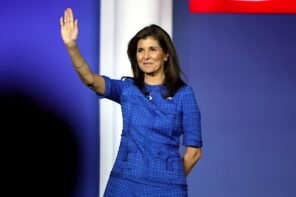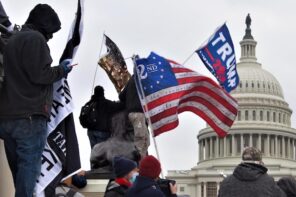Americans of conscience are exhausted by law-and-order grief—a chronic remorse and lamentation emanating from police violence visited upon unprotected peoples. The storied American tradition of anti-Black policing crudely lengthens the legacy of Black mothers’ tears as yet another unarmed Black man called out for his mother as he died under the heavy arms, vicious swings, and steel feet of Blueness. For this moment, Mr. Tyre Nichols, 29, now lives deep within the hearts of millions of people as one of the latest, though surely not to be the last, victims of Blue predation and surveillance that ducks behind the veneer of “protect and serve.”
Raised by a single mother in Texas, I cherish the various roles an extended village played in making my rearing whole. Second only to my maternal grandfather, my late elder cousin Anthony Ruben, Sr.—a career Black police officer—played an outsized paternal role in my childhood. I learned to play basketball and football, was transported to and from school, and witnessed familial fidelity from a Black cop. However, those treasured lessons and memories fail to erase the duly founded and deep suspicions I harbor concerning American policing. When pulled over on the side of the highway, my anxiety doesn’t abate just because a Black officer steps out of the arresting vehicle. I still see Blue.
Black people are typically treated as nameless, only made visible by impositions of criminality and state control. Of course, the doctrine of Whiteness at work in the public imagination, American halls of power, and individual minds normalizes narratives of presumptions of danger and guilt for Black flesh. The thingification of descendants of chattel slaves, and other citizens and residents who bear their shades of non-Whiteness, operates as a cardinal project of police culture.
The police forces in the South originally organized to patrol slaves—Black people running for their freedom and safety from state-honored violence known as chattel slavery. In fact, U.S. policing started in Boston to control poor Irish immigrants; in the South to maintain the slavocracy; and in the Midwest to intimidate Native Americans into a unique form of segregation. The anti-Black, anti-immigrant, anti-poor ethos of our policing keeps these histories alive on our streets as disempowered communities live vulnerable to what Achille Mbembe calls necropolitics.
The death of Mr. Nichols unveils something more complex than Whiteness. Blue privilege licensed the life-snatching beating he suffered on the 7th of January. Blue privilege is an offspring of White privilege. In fact, Blue privilege pivots on a social mimicking of Whiteness, maleness, and heteronormativity and is a coercive power that colludes with Whiteness to foreclose Black freedom. This social advantage metes out individual benefits to law enforcement personalities and functions as a social imagination that protects, perpetuates, and normalizes a racist culture of patrol and punishment in the United States—the world’s industrialized incarceration capital.
Akin to how White supremacy is not about individual White people, Blue privilege refers to the systems and patterns that insulate a culture of law enforcement violence and unaccountability, not individual police officers—city cops, state police, school resource officers, or border patrol. The people adorned in “the blue” profoundly benefit from austerely unearned legal protections, grossly unquestioned public mobility, and perceptible community trust often undergirded by an imposed social etiquette.
These unearned, though conditional, advantages for police officers categorically shield multifarious anti-Black over-policing that serves the interests of maintaining White privilege and protecting a White republic. Establishing some hallmarks of Blue privilege, the nature of Blueness in the U.S. conditions the public to normalize that cops:
- enact the sovereignty to determine who lives and dies;
- function as a judicially-protected class;
- employ fear as a form of social control;
- perpetuate the delusion of post-racialism;
- investigate their own alleged misconduct and criminal activities;
- self-determine the applicability of laws;
- inherit a sense of innocence in the name of duty;
- possess nearly unfettered access to and movement within public and private spaces;
- benefit from a legitimation of personal feelings as the rationale for professional actions; and
- act as ambassadors-at-large of the highest ideals of liberty, justice, and peace.
Emboldened by a mandate under the merciless, by-any-means job description as the Scorpion Unit, those police officers vomited up expletives, joshed and huffed, exchanged pleasantries, and smoked cigarettes as life gradually slipped out of Mr. Nichols’ Black body—possibly a more rabid display of inhumanity than their street-style punching and athlete-form kicking. These Black officers epitomized Blue privilege as they assumed protection under the law as citizens who worked above the law.
Their post-beating playful banter and laissez-faire attitude signaled their sense of professional justification and public unaccountability for several minutes of power-crazed policing. The video communicated a horrid exhibition of satisfaction within men who thought they performed their job well in the case of Mr. Nichols. Such soulless behavior epitomizes Blue privilege, which was recently magnified by the unanimous not-guilty pleas from the five indicted former officers.
Unambiguously, Black police officers experience a range of discrimination within police departments, which Blueness fails to prevent. Blueness endows “peace officers” with an elevated type of social capital that supplants preexisting identity stigmas related to race, ethnicity, class, or gender. Irrespective of the racial identity of an officer, the systemic nature of racial profiling which occasions instances of anti-Black police violence regularizes and perpetuates anti-Black and anti-poor biases as features of the job.
To an extent, Blueness assumes to temporarily and conditionally absorb the disadvantaged aspects of one’s social location as said persons perform the job. The power and position garnered by badge and bullets—symbols of the Blue—distort a commitment to public service and safety by conflating their professional and personal identities, often allowing the former to overwhelm, even displace the latter. Blueness superseded the officers’ Blackness, along with their professionalism, training, and commonsense.
Unfair burdens and absurd expectations are placed on Black people in Blue to radically transform a system that sprouted out of a history of organized oppression. While a personnel diversity influx reflects a facet of a remedy, we need structural transformations of policy that far exceed treating the problems as merely interpersonal biases. Likewise, our shared life together necessitates more than criminal charges and convictions for individual officers—Black or White. Here’s our opportunity for us to climb through this window of political opportunity for our nation to achieve systemic change.
In other crucially necessary areas of our society, the passage and enforcement of civil and human rights legislation correlated to changes in public attitudes toward protections for vulnerable communities and the role of government. New regulations that cast unfettered police power and police violence as unambiguously criminal and normalize it as punishment may set the stage to change the meaning of Blueness and how officers live out their service to the public. Such legislation can reshape the public discourse on the acceptability of law-and-order violence and how we see those targeted by its mercilessness. At their best, when not tied to racial capitalist power-hoarding, stripping human rights, and condemning non-White people, our laws potentially serve as moral guideposts that impact our behaviors and attitudes. Policy can either atone for the sins of the state or perpetuate structural iniquities.
Blueness, like its progenitor Whiteness, dramatizes the structural and systemic lovelessness in the public square. It’s commonplace for us to grapple with questions of public policy, public spending, and public safety—but what about public love? Public love creates the necessary space for justice to be the rendezvous point of the political, moral, and spiritual. As we increasingly over-regulate bodies and under-regulate systems, only public love can abolish blue privilege through municipal, state, and federal policies like the omnibus proposals of the George Floyd Justice in Policing Act, which passed the House of Representatives during the 117th US Congress and was championed by President Joseph R. Biden.
The future of our communities, democracy, and humanness can no longer sustain the death-making institutionalism so intimately associated with the American vocation of policing, profoundly soaked in racism, classism, and abuse of power. If we cannot change the hearts of people, we can pass policies that bring forth accountability. Philosopher Cornel West often avers, “Justice is what love looks like in public, just like tenderness is what love feels like in private.” Public safety is not enough. The centuries-deep pain inflicted by our police culture begs for the advent of public love that ends Blue privilege.





